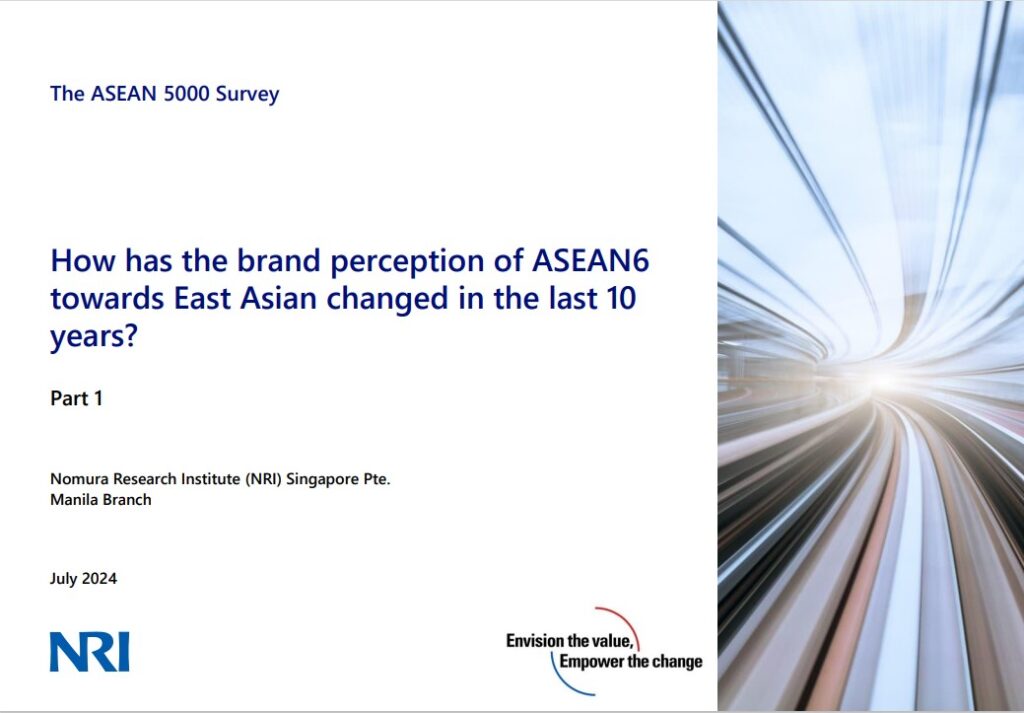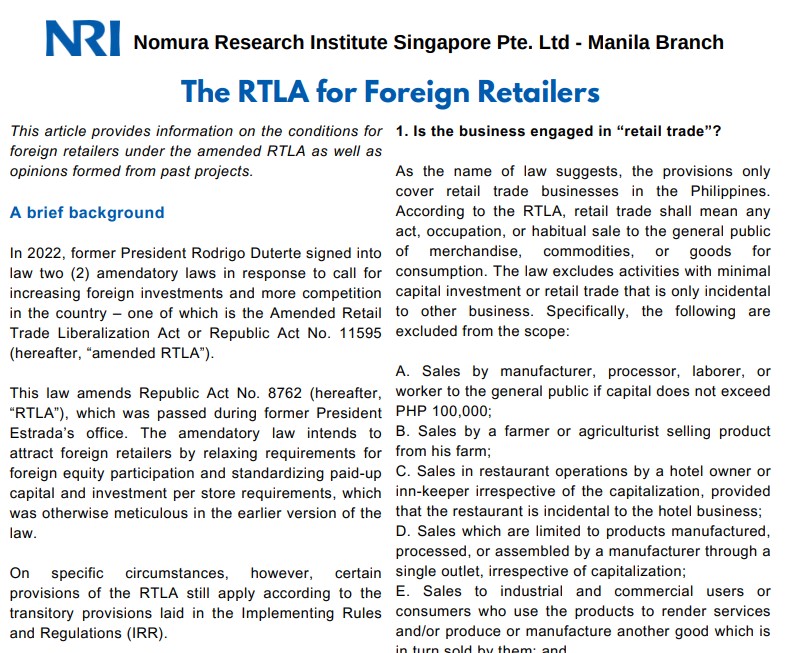Business Insights
How has the brand perception of ASEAN6 towards East Asian changed in the last 10 years
In 2013, NRI conducted a survey on market attractiveness and brand image across ASEAN. A decade later, we revisit this study to analyze shifts in consumer perception, particularly how they impact automotive branding, especially electric vehicles (EV), in the Philippines, through our ASEAN 5000 Survey series. In Part 1, (more…)
Read MoreNRI Manila’s Japanese Cross-Cultural Understanding Training for BPI MS Insurance Corporation
Nomura Research Institute (NRI) Manila Branch recently conducted a successful Japanese Cross-cultural Understanding (CCU) program for BPI MS Insurance Corporation (BPI MS). Among the participants included various team members, ranging from staff to managers across different departments. The CCU training focused on equipping BPI MS employees with the skills to (more…)
Read MoreRising GDP Capita and the Filipino Middle Class
Back in 2012, the Asian Development Bank (ADB) published a paper entitled Tracking the Middle-Income Trap: What is It, Who is in It, and Why? According to their research, the Philippines – as of 2010 – has been a lower middle-income economy for the past 34 years. 14 years later (more…)
Read MoreThe RTLA for Foreign Retailers
Nitori, a Japanese furniture seller, opened its first retail store in the Philippines last April. This was, according to Trade Secretary Pascual, the first major investment under the amended Retail Trade Liberalization Act (RTLA). The amendatory law was supposed to attract foreign retailers to set up shop in the country. (more…)
Read MoreConsumption Spending through the Eyes of Groceries
The 3rd quarter Philippine GDP numbers suggest that inflation has affected the different economic classes disproportionately. The higher classes, who can afford to spend on hotels and restaurants continue to do so, despite high inflation and rising interest rates. On the contrary, the lower classes who only spend on the (more…)
Read MoreE-Commerce in the Post-Pandemic Philippines Part 2: How can businesses capture more Filipino shoppers online?
In the previous article, we concluded that e-commerce is here to stay and will form a larger part of PH economy. As more Filipinos go online to shop, competition in the e-commerce space will only become tougher and winning for business may mean employing multiple strategies and forging partnerships. In (more…)
Read MoreE-Commerce in the Post-Pandemic Philippines Part 1:Is e-commerce here to stay?
Adoption of e-commerce by Filipinos have been accelerated, if not forced, by the pandemic. From 2019 to 2022, e-commerce revenues have almost doubled (from USD 8.5 billion in 2019 to USD 16 billion in 2022) according to Statista data. Now that traditional channels have reopened and further lockdowns are not (more…)
Read MoreHow has inflation affected the purchasing capacity and budget management of Filipinos?
94% of Metro Manila’s middle-class Gen Zs and Millennials felt the impact of inflation in the 2nd quarter of 2023. This summary report outlines the impact of recent inflation on the finances of Metro Manila’s middle-class younger working force, based on the survey conducted by NRI Manila from May to (more…)
Read MoreGrowing Concern: 94% of Metro Manila’s Middle-Class Gen Zs and Millennials Felt the Impact of Inflation in the 2nd Quarter of 2023
With inflation rising beyond the government’s targets, the cost of living in the Philippines, particularly in major cities, has steadily increased, giving rise to notable challenges on the finances of Filipinos. In this study, NRI Manila Branch sought to understand how inflation has influenced the consumption, savings, debt, and investment (more…)
Read MoreASEAN Urban Life Survey 2023 (English Version)
In January 2023, Nomura Research Institute Singapore conducted a survey in six ASEAN countries (Singapore, Malaysia, Philippines, Indonesia, Thailand, Vietnam) to identify the lifestyles of consumers in the ASEAN region. The survey focused on the three themes of ‘Work’, ‘Housing & Shopping’, and ‘Travel & Entertainment’, while analysing and extracting (more…)
Read More









